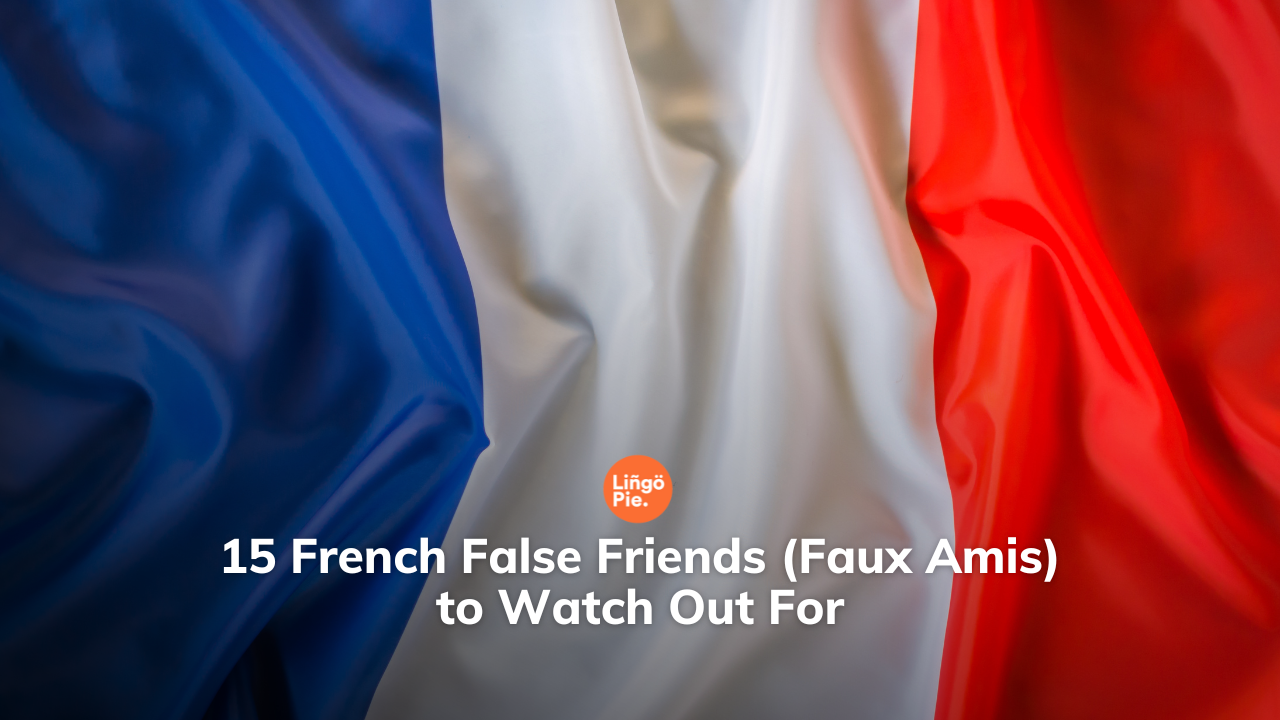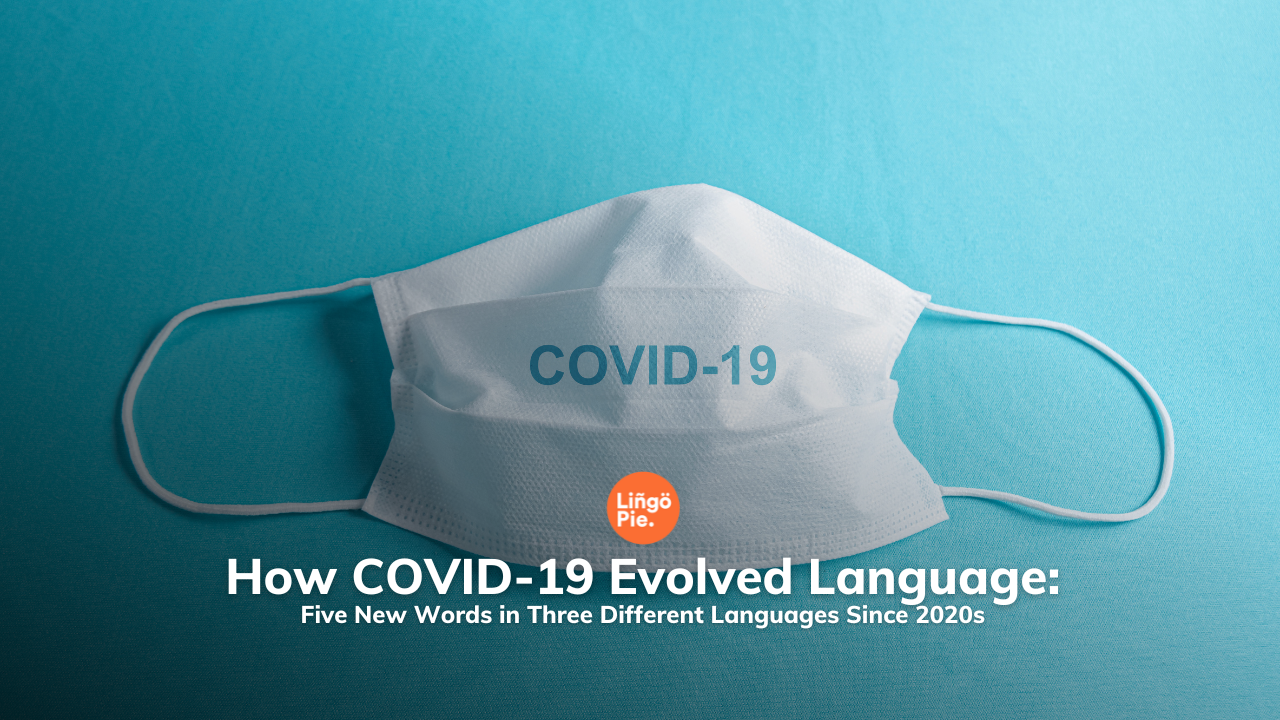Do you have any fake friends? In French, there are loads of them. Wait… what?
Let me explain: the English and the French have always had a complex relationship throughout history, and the same goes for their vocabulary! Faux amis (fake/false friends) are words that appear to mean the same in different languages but actually have completely different meanings.
Example: Un raisin (french) is not a raisin in English (it is actually a grape).
Because the words are identical looking, this can generate a lot of confusion for learners and creates some embarrassing situations during conversations. There are quite a few faux-amis (fake friends) in the French language, and you just have to learn to recognize them to avoid making mistakes.
They can be very misleading and deceptive.

Why are there so many faux amis in French?
The reason there are so many faux amis is that it’s estimated that 30% of the English vocabulary comes from the French language. How crazy is that!?
Becoming familiar with the French language as much as possible is the key to avoiding using faux amis. With Lingopie, you can practice your French by watching films, documentaries, series and more at your own pace. No matter what level you are at, you have the option of following along with the subtitles in both English and/or French.
Learning French from a textbook just isn’t enough if you want to become fluent. You need to expose yourself to the language by listening to it, as well as practicing speaking it. With Lingopie you have the option of practicing your pronunciation with the microphone tool. Your accuracy will be assessed so that you improve every time. Slowly you will build your vocabulary and you will find it easier to avoid using faux amis.
So,back to my original topic, here is a list of some of the most commonly made mistakes when it comes to faux amis in French:
What are the most common French faux amis?
1. Bras
What it looks like it means: a bra
What it really means: an arm
In French, the word ‘le bras’ means ‘arm’, rather than the female undergarment.
If you want to know the french word for bra it is ‘un soutien-gorge’. Remember this one because it can be awkward to get this muddled up in the middle of a conversation!
Here are some French expressions with the word ‘bras’:
‘Baisser les bras’. To give up
‘Rester les bras croisés’. To sit idly by/ to stand around doing absolutely nothing
2. Blessé
What it looks like it means: blessed
What it actually means: hurt, injured, wounded
‘Blessé’ means to be injured or wounded, rather than to be blessed (which is what it looks like it should be!). ‘Blessé’ comes from the verb ‘blesser’ which means to hurt somebody.
Example: L’accident a fait deux blessés. Two people were injured in the accident.
The actual word for ‘blessed’ in French is ‘béni(e)’.
3. Excité(e)
What it looks like it means: excited
What it actually means: horny/ sexually aroused
If you say ‘je suis excité(e)’ in French, you are not saying that you are excited, you are saying that you are horny! *major awks moment*. This is a very common mistake to make (Emily makes the same mistake in the Emily in Paris series!).
If you want to say you are excited for something, stick to ‘J’ai hâte de…’ or ‘Je suis impatient(e) de…’ or ‘il me tarde de…’
4. Actuellement
What it looks like it means: Actually
What it actually means: Currently/ now/ at the moment
This is a very easy word to misinterpret. ‘Actuellement’ means ‘currently’ or ‘now’. Here is an example of a phrase with actuellement:
‘Elle travaille actuellement en France’. She is now working in France.
If you want to say ‘actually’ in French, use ‘en fait’.
5. Journée
What it looks like it means: a journey
What it actually means: day/ daytime
This is another common mistake French learners make. ‘Journée’ means ‘day’ rather than ‘a journey’. Look at these examples:
Bonne journée: Have a good day
Il a plu toute la journée: It rained all day
The French word for journey is ‘voyage’ . This might be easy to remember because of the well-known expression ‘bon voyage’!
6. Raisin
What it looks like it means: a raisin
What it actually means: a grape
I used to get mixed up with this one a lot when I was learning French myself. ‘Un raisin’ is NOT ‘a raisin’ in English but rather ‘a grape’. (And technically raisins are dried grapes which makes it even more confusing! Eurgh!!)
For reference, the word for raisin in French is ‘raisins secs’ (plural).
7. Un Préservatif
What it looks like it means: a preservative
What it actually means: a condom
To avoid embarrassment, it’s best to really learn this one. ‘Un préservatif’ is a condom. Please try not to ask a waiter at a French restaurant if your food has any ‘préservatifs’. You will most likely get a weird look back, to say the least haha!
The word for preservatives is actually ‘conservateurs’.
8. Joli(e)
What it looks like it means: jolly/happy
What it actually means: pretty/ handsome/ nice/ lovely
Here’s another nasty faux ami. Contrary to popular belief ‘jolie(e)’ does not mean ‘jolly’, but rather ‘pretty’ or ‘nice’.
Here’s an example: Tu es une jolie fille. You are a pretty girl
The word for jolly in French is ‘gai(e)’.
9. Éventuellement
What it looks like it means: Eventually
What it actually means: Possibly, maybe, potentially
‘Éventuellement’ definitely looks like it should mean ‘eventually’ in English, but it actually means ‘possibly’.
Take a look at this sentence:
Je crains d'être éventuellement en retard. I’m afraid I’ll possibly be late.
The word for ‘eventually’ in French is ‘finalement’.
10. Sensible
What it looks like it means: Sensible
What it actually means: Sensitive
This is another false friend people often get muddled with. ‘Sensible’ means ‘sensitive’ in English.
Example: Elle est très sensible. She is very sensitive.
The word for ‘sensible’ in French is ‘raisonnable’. Look at this example:
Sois raisonnable! Be sensible!
11. Location
What it looks like it means: a location
What it actually means: rental, the rent
‘Location’ is another faux ami. It means ‘a rental’ rather than ‘a location’.
Look at these examples:
La location de voitures. Car rental
Location de skis. Ski hire/rental
If you want to say ‘a location’ in French, stick to ‘un lieu’ or ‘un endroit’
12. Librairie
What it looks like it means: a library
What it actually means: a bookshop
This is super confusing, I know! ‘Librairie’ does not translate as ‘library’ but rather as ‘bookshop’. So you cannot borrow a book from a ‘librairie’, but you can buy one.
The French word for ‘a library’ is ‘une bibliothèque’
13. Magasin
What it looks like it means: a magazine
What it actually means: a shop
When I was studying French this was the false friend that tripped me up the most. ‘Un magasin’ is a shop, not a magazine. Take a look at this example:
Les magasins ouvrent à 7h. The shops open at 7 o’clock.
The word for ‘magazine’ in French is the same as in English: ‘magazine’. (It still looks very similar to ‘magasin’ so take time to learn this one off by heart).
14. Rester
What it looks like it means: to rest
What it actually means: to stay/to remain
Another sneaky faux ami is ‘rester’. Most people assume it means ‘to rest’ but it actually means ‘to stay’.
Example: Je suis resté à la maison. I stayed at home.
The French word for to rest is ‘se reposer’.
15. Attendre
What it looks like it means: to attend
What it actually means: to wait for
Attendre does not mean to attend. It is the verb for to wait for somebody/ something. Look at this example:
J’attends ma sœur tous les jours à la même heure. I wait for my sister every day at the same time.
If you want to say the word attend in French, use ‘assister à’.

Summing up:
So, how many of these were you familiar with? As you can see, the French language is full of faux amis. They can be deceiving but you don’t have to let them trip you up. The more you familiarize yourself with French the less mistakes you are likely to make. You can start by learning this list of 15 French false friends.
But there are plenty more out there. Are you familiar with any others? As I mentioned before, listening to French as much as possible is key to avoiding mistakes.
Learning with Lingopie is such a useful way to keep up to date with the French that is used in daily life. You will also be immersing yourself in French culture whilst binge watching some shows. It’s a win-win situation!
Create an account today and start to excel in your French language learning. If you sign up today you get 70% off.
Bonne chance!









